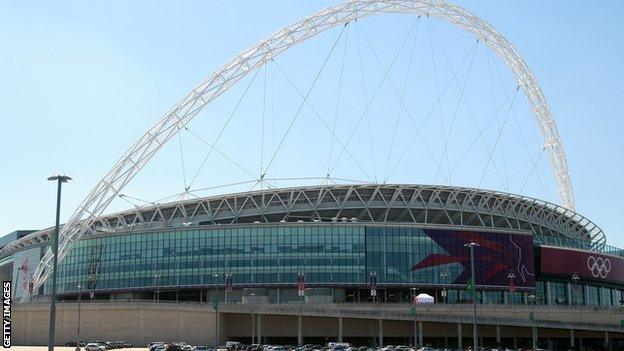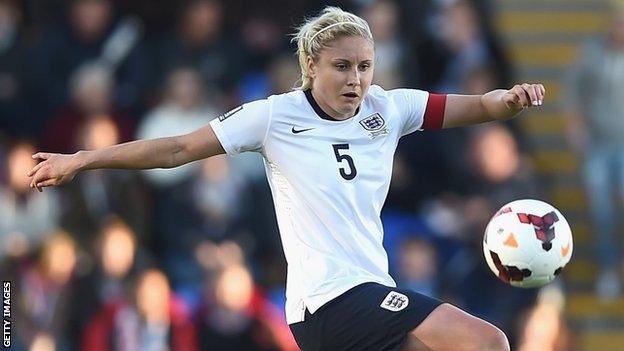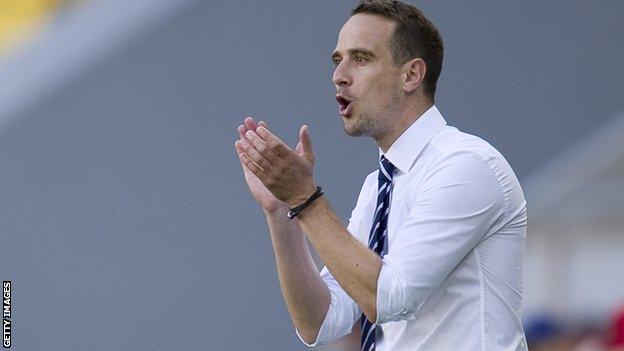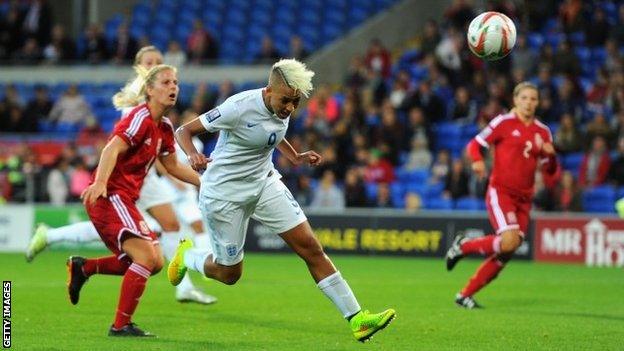England's women footballers pull bigger crowd than men
- Published
When Toni Duggan interviewed Steph Houghton
This afternoon, eleven England internationals will walk out at Wembley to the roar of a sell-out crowd.
Each will have the famous three lions badge on their shirts.
That may all sound familiar, but those inside the stadium, and the many more watching at home, will be witnessing history.
Sunday's international friendly against old rivals Germany will be the first time England's women have played at the new home of English football.
And more than 55,000 tickets have been sold, far more than the 40,181 that saw the last Wembley friendly involving England's men.

Team GB were watched by 70,584 when they beat Brazil at Wembley during the 2012 Olympics
Interest in the women's game hasn't been this feverish since 1920.
Back then crowds regularly dwarfed modern attendances for the men's game, with one recorded at 53,000.
But then an FA ban on the women's game a year later stopped progress for decades.
Officials deemed the sport "unsuitable for females" with the restriction not lifted for another half century.
This season though the climax to the domestic Women's Super League was televised and Sunday's match will be broadcast on BBC2.
"It's unbelievable that we've sold 55,000 tickets," England defender Steph Houghton told Newsbeat.
"I speak on behalf of all the girls and say we're really, really excited. Times have changed massively over the last few years."

England captain Steph Houghton has 50 international caps
However, greater interest and exposure breeds added expectation and pressure.
Much like the men's abject failure in Brazil last summer, England's women bombed out of their last major competition.
One point out of nine from their three games at the European Championships in 2013 was a poor return by anyone's standards.
It was an opportunity lost to showcase the women's game to the country.
Hope Powell, who transformed the game in her 15 years in charge of the national side, was sacked.

Mark Sampson has guided England to a third successive World Cup finals
Mark Sampson was brought in to replace her and tasked with rebuilding the squad's confidence and profile.
It's going well. Sampson has won 10 of his 12 games in charge and has lifted England to seventh in the world rankings.
Sunday's opponents Germany are second.
The sides last met in the final of the 2009 European Championships, a game which the Germans won 6-2 at the Olympic Stadium in Helsinki.
"Germany have always been an incredibly strong nation in women's football," said Sampson.
"They're a team that continue to get results, they're always at the end of major championships, and they're European champions - so we'll expect a really tough game."
There's no doubting a result against the Germans would be a huge scalp, especially considering the exposure the match will be getting.
Although the side's main focus is next year's World Cup in Canada.

Lianne Sanderson and her team-mates can look forward to the World Cup in Canada
With 10/10 wins in qualification, hopes are high that an England team can finally bring back football's biggest prize.
"At the moment we've got a really good squad in terms of youth and experience. I think the balance is right," Steph Houghton told Newsbeat.
"We've got six months to prepare and I think we've got a really good chance."
Women's football is one of the world's fastest growing sports, with over 30 million women participating worldwide.
The hope here is if the women's team can couple success on the pitch with the sport's growing profile, more and more women will start to play.
"The most important thing is to enjoy playing," said Houghton.
"Never lose the fact that you love the game. If you get the opportunity to go and train with coaches, listen to them and work as hard as you possibly can."
England take on Germany at 1500 GMT on Sunday 23 November. You can catch all the action live on BBC Two, Radio 5 live sports extra and the BBC Sport website.
Follow @BBCNewsbeat, external on Twitter and Radio1Newsbeat, external on YouTube